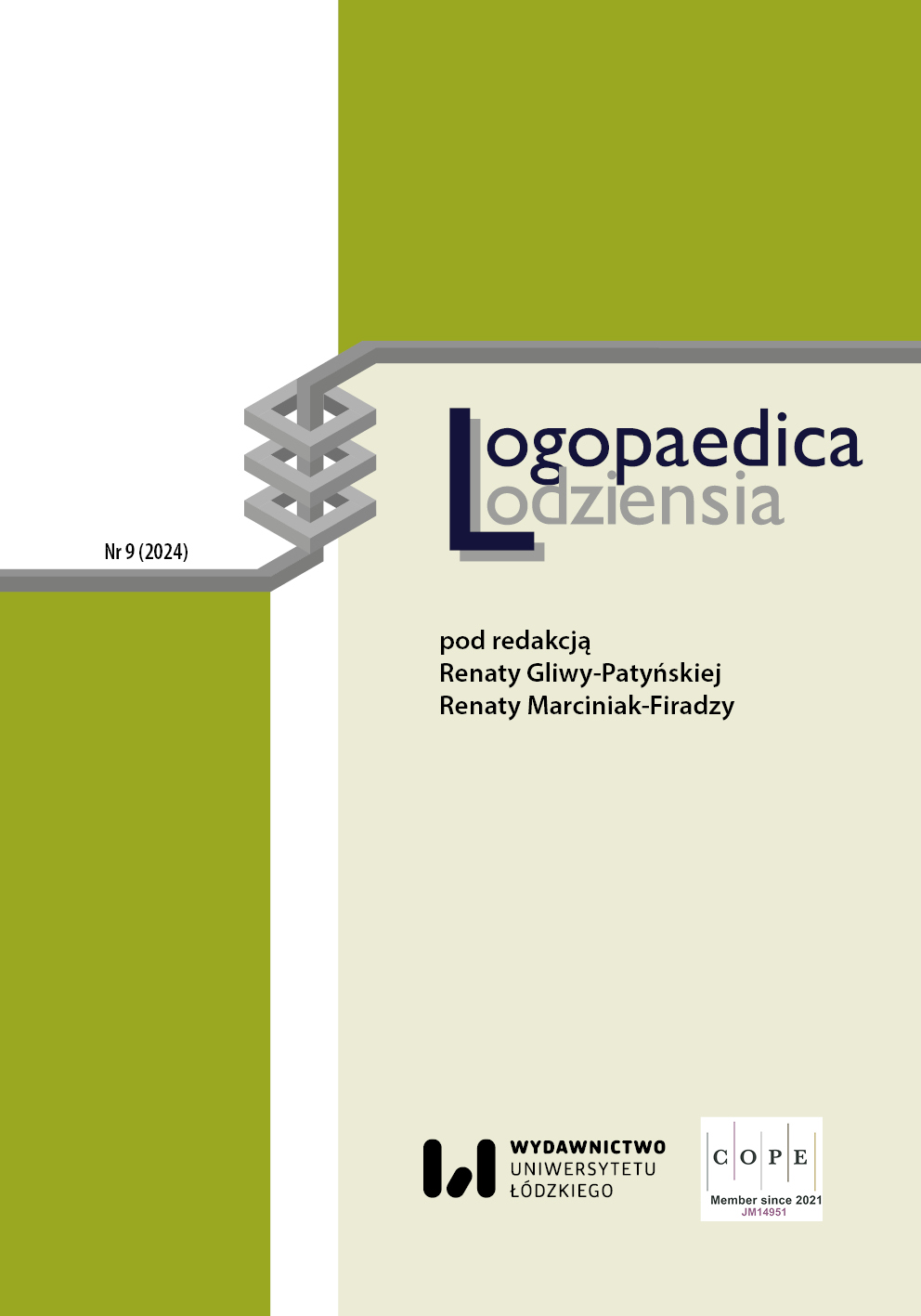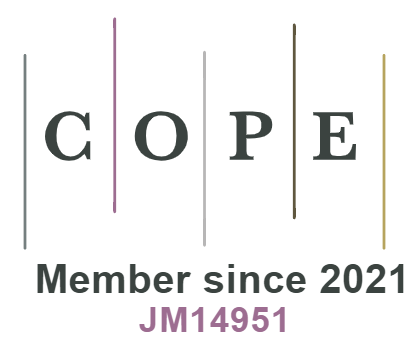Experiencing the Diagnosis of Delayed Speech Development by Parents of Children with Language Disorders of Unknown Etiology. Phenomenological Study
DOI:
https://doi.org/10.18778/2544-7238.09.05Keywords:
delayed speech development, phenomenological study, parents’ experiencesAbstract
The text consists of four parts. The first one discusses the phenomenon of delayed speech development, as well as how parents experience the diagnosis of various diseases and disorders in their children. Then, the author presents the methodology of the phenomenological study. The third part discusses the results obtained as part of the study so that they can be compared with other works of this type at the end of the article.
Downloads
References
Acker L., Knight M., Knott F., 2018, ‘Are they just gonna reject me?’ Male adolescents with autism making sense of anxiety: An Interpretative Phenomenological Analysis, „Research in Autism Spectrum Disorders”, Vol. 56, s. 9–20, https://doi.org/10.1016/j.rasd.2018.07.005
Google Scholar
DOI: https://doi.org/10.1016/j.rasd.2018.07.005
Belgin P., Abraham B., Baburaj S., Mohandas M.K., 2017, Environmental and biological risk factors associated with the prevalence of language delay in children upto 6 years of age from Rural South India, „Journal of Clinical and Diagnostic Research”, Vol. 11(12), s. 11–14.
Google Scholar
DOI: https://doi.org/10.7860/JCDR/2017/31738.10943
Boksa E., 2016, Dysfagia z perspektywy zaburzeń komunikacji językowej u dzieci i młodzieży z niepełnosprawnościami sprzężonymi, Kraków: Wydawnictwo Libron.
Google Scholar
Borox T., Dassie Leite A.P., Bagarollo M.F., Freire de Alencar B.L., Czlusniak G.R., 2018, Speech production assessment of mouth breathing children with hypertrophy of palatines and/or pharyngeal tonsils, „CEFAC”, Vol. 20(4), s. 468–476.
Google Scholar
DOI: https://doi.org/10.1590/1982-021620182043118
Brown J.W., 1976, The natural organization of language aphasia and lateralization, „Brain and Language”, Vol. 3(4), s. 482–494.
Google Scholar
DOI: https://doi.org/10.1016/0093-934X(76)90043-2
Colaizzi P.F., 1978, Psychological research as a phenomenologist views it, [w:] R.S. Valle, K. Mark (red.), Existential phenomenological alternatives for psychology, New York: Oxford University Press, s. 48–71.
Google Scholar
Corr Ch.A., 2021, Elizabeth Kübler-Ross and the “Five Stages” Model in a Sampling of Recent American Textbooks, „OMEGA – Journal of Death and Dying”, Vol. 82(2), s. 294–322, https://doi.org/10.1177/0030222818809766
Google Scholar
DOI: https://doi.org/10.1177/0030222818809766
Eatough V., Smith J.A., 2017, Interpretative phenomenological analysis, [w:] C. Willig, W. Stainton-Rogers (red.), Handbook of Qualitative Psychology, London: Sage, s. 193–211.
Google Scholar
DOI: https://doi.org/10.4135/9781526405555.n12
Ellis J.B., Hirsch J.K., 2000, Reasons for living in parents of developmentally delayed children, „Research in Developmental Disabilities”, Vol. 21(4), s. 323–327.
Google Scholar
DOI: https://doi.org/10.1016/S0891-4222(00)00045-7
Famuła-Jurczak A., 2020, Społeczne konsekwencje zaburzenia komunikacji dzieci ze spektrum autyzmu, [w:] L. Kataryńczuk-Mania (red.), Emisja głosu w przestrzeni edukacyjnej, artystycznej i terapeutycznej, Zielona Góra: Wydawnictwo Uniwersytetu Zielonogórskiego, s. 309–322.
Google Scholar
Giorgi A., 1971, A phenomenological approach to the problem of meaning and serial learning, „Duquesne Studies in Phenomenological Psychology”, Vol. 1, s. 88–100.
Google Scholar
DOI: https://doi.org/10.5840/dspp1971111
Hess-Wiktor K., Opoczyńska-Morasiewicz M., 2014, Przegląd metod badawczych stosowanych w ujęciu idiograficznym, [w:] M. Opoczyńska-Morasiewicz (red.), Poza zasadą powszechności: próby idiograficzne, Kraków: Wydawnictwo Uniwersytetu Jagiellońskiego, s. 167–191.
Google Scholar
Hitos S.F., Arakaki R., Solé D., Weckx L.L.M., 2013, Oral breathing and speech disorders in children, „Journal de Pediatria”, Vol. 89(4), s. 361–365.
Google Scholar
DOI: https://doi.org/10.1016/j.jped.2012.12.007
Hopkins R.M., Regehr G., Pratt D.D., 2016, A framework for negotiating positionality in phenomenological research, „Medical Teacher”, Vol. 39(1), s. 20–25, https://doi.org/10.1080/0142159x.2017.1245854
Google Scholar
DOI: https://doi.org/10.1080/0142159X.2017.1245854
Howlin P., Asgharian A., 1999, The diagnosis of autism and Asperger syndrome: findings from a survey of 770 families, „Developmental Medicine & Child Neurology”, Vol. 41(12), s. 834–839.
Google Scholar
DOI: https://doi.org/10.1017/S0012162299001656
Hycner R., 1985, Some guidelines for the phenomenological analysis of interview data, „Human Studies”, Vol. 8(3), s. 279–303, https://doi.org/10.1007/BF00142995
Google Scholar
DOI: https://doi.org/10.1007/BF00142995
Jachimowska K., 2018, Od negocjacji do akceptacji – postawy rodziców wobec niepełnosprawności swojego dziecka, [w:] E. Szkudlarek-Śmiechowicz, B. Cieśla (red.), Negocjacja w języku, tekście, dyskursie, Łódź: Wydawnictwo Uniwersytetu Łódzkiego, s. 225–236.
Google Scholar
Jastrzębowska G., 2005, Opóźnienie rozwoju mowy, [w:] T. Gałkowski, E. Szeląg, G. Jastrzębowska (red.), Podstawy neurologopedii. Podręcznik akademicki, Opole: Wydawnictwo Uniwersytetu Opolskiego, s. 360–378.
Google Scholar
Knapek M., 2020, Anatomiczne i fizjologiczne uwarunkowania opóźnienia rozwoju mowy: oddychanie i fonacja, „Forum Logopedy”, nr 39, s. 5–10.
Google Scholar
Knapek M., Kozioł-Kozakowska A., 2020, Anatomiczne i fizjologiczne uwarunkowania opóźnienia w rozwoju mowy: jedzenie, „Przegląd Logopedyczno-Pedagogiczno-Psychologiczny”, nr 2, s. 76–86.
Google Scholar
Kręcisz-Plis E., 2020, Zaangażowanie rodzicielskie a percepcja doświadczeń rodziców dziecka z chorobą przewlekłą, „Niepełnosprawność”, nr 37, s. 265–287.
Google Scholar
Panasiuk J., 2015, Postępowanie logopedyczne w przypadku alalii i niedokształcenia mowy o typie afazji, [w:] S. Grabias, J. Panasiuk, T. Woźniak (red.), Logopedia. Standardy postępowania logopedycznego, Lublin: Wydawnictwo Uniwersytetu Marii Curie-Skłodowskiej, s. 309–348.
Google Scholar
Pilecki M., 2007, Rodzinne brzemię zaburzeń w rozwoju, „Sztuka Leczenia”, t. 14, nr 1–2, s. 59–67.
Google Scholar
Robertson S.B., Weismer S.E., 1999, Effects of treatment on linguistic and social skills in toddlers with delayed language development, „Journal of Speech, Language and Hearing Research”, Vol. 42, s. 1234–1248.
Google Scholar
DOI: https://doi.org/10.1044/jslhr.4205.1234
Russ S.W., 2004, Play in Child Development and Psychotherapy: Toward Empirically Supported Practice, Mahwah–London: Lawrence Erlbaum Associates, Inc.
Google Scholar
DOI: https://doi.org/10.4324/9781410609397
Smith J., Flowers P., Larkin M., 2009, Interpretative Phenomenological Analysis: Theory method and research, London: Sage.
Google Scholar
Stasiak J., 2014, Alalia. Perspektywy opisu, [w:] S. Grabias, M. Kurkowski (red.), Logopedia. Teoria zaburzeń mowy, Lublin, Wydawnictwo Uniwersytetu Marii Curie-Skłodowskiej, s. 337–360.
Google Scholar
Walker A., Tobbell J., 2015, Lost Voices and Unlived Lives: Exploring Adults Experiences of Selective Mutism Using Interpretative Phenomenological Analysis, „Qualitative Research in Psychology”, Vol. 12(4), s. 453–471, https://doi.org/10.1080/14780887.2015.1054533
Google Scholar
DOI: https://doi.org/10.1080/14780887.2015.1054533
World Health Organization, 2001, International Classification of Functioning, Disability and Health (ICF), https://www.who.int/standards/classifications/international-classification-of-functioning-disability-and-health (dostęp: 13.08.2024).
Google Scholar
Downloads
Published
How to Cite
Issue
Section
License

This work is licensed under a Creative Commons Attribution-NonCommercial-NoDerivatives 4.0 International License.












